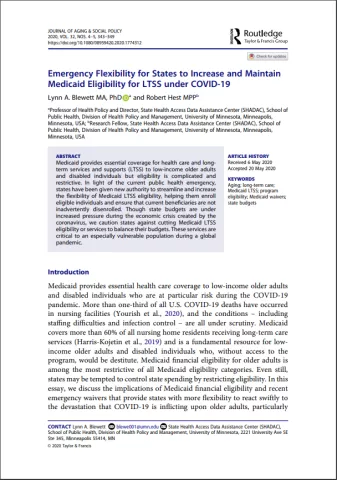In response to the current public health emergency presented by COVID-19, especially the health risks pertaining to low-income older adults and disabled persons, states have been given new authority with regard to Medicaid in order to ease traditional complications and restrictions surrounding eligibility. A new article from SHADAC Director and UMN School of Public Health Professor Lynn A. Blewett, PhD, and SHADAC Research Fellow Robert Hest, MPP, focuses specifically on how this state-level Medicaid program flexibility, along with recent emergency waivers, can expand Medicaid financial eligibility for long-term supports and services (LTSS) for these at-risk individuals.
Traditionally, Medicaid LTSS eligibility criteria for states (though federal standards are also a key component) have been based on financial rules and functional needs assessments. Due to complexities surrounding these eligibility requirements, many beneficiaries are at risk of losing coverage throughout the year. Under public health emergency authority granted to states during the COVID-19 pandemic, however, mechanisms such as state plan amendments (SPAs), section 1115 and 1135 waivers, and 1915(c) Appendix K can be used by states to ease these difficulties and ensure that eligible individuals get coverage, including:
- Reducing administrative burdens for applicants
- Streamlining eligibility redeterminations
- Extending deadlines to conduct evaluations/assessments
- Temporarily suspending authorization requirements
- Relaxing eligibility requirements
While states are adopting these flexible measures to expand eligibility, they are simultaneously facing increasing pressures to curb state spending as budgets are constrained during the pandemic. Medicaid spending, most especially for LTSS, is a prime target for cuts as it accounts for a large majority of states’ budgets. However, the article argues that LTSS provided by Medicaid is an essential service for low-income older adults and disabled individuals who are at particular risk from COVID-19, and therefore it is critical that eligibility and flexibility be maintained in order to meet the increasing demand for services created by the coronavirus.
Read the full article in the Journal of Aging & Social Policy.

